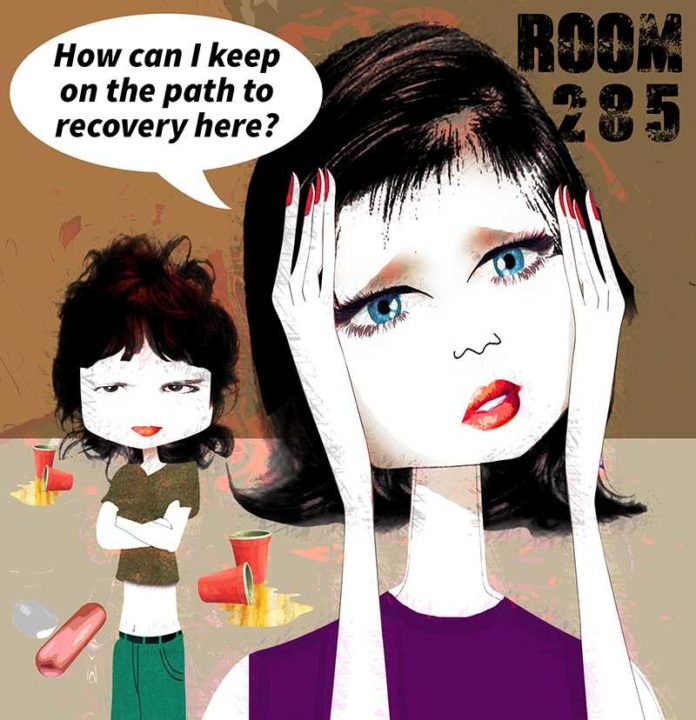Imagine being a college student actively trying to recover from a drug or alcohol addiction, but you’re in an environment where the social norm is to drink and participate in other risky behaviors. How does that affect your ability to be able to recover and live a sober lifestyle while also maintaining your student status?
Starting the fall of 2016, students pursuing active recovery will now have a safe haven to live on campus in a Living Learning Community (LLC) with the company of other students pursuing active recovery with the guidance of professionals who are knowledgeable on addiction.
The Rocket staff feels that this is a wonderful opportunity for students in recovery and we feel as if this shows Slippery Rock University’s dedication to provide an inclusive environment for all students.
Gerard Love, associate professor in counseling and development, is the driving force behind the LLC called Rock Recovery. He distinguished the difference between substance abuse and substance addiction.
Abuse is when a person uses too much, too often and at inappropriate times by choice. Addiction is when a person uses too much, too often and at inappropriate times not by choice and despite negative consequences. Society places a heavy stigma on people who are suffering from addiction; however we acknowledge that these students who will need this rehabilitation program are not bad people and deserve a chance at education just like any other student on this campus.
This program is open to any student who wants to be in an inclusive college environment, but wants to stay on track and keep away from tempting substances that would take them off track from recovery.
This is a great opportunity to allow students who may not have gotten the best start in life to not only heal, but also to be in an environment where people understand and are able to give advice based on personal experience.
Originally our staff was skeptical that the worth of the LLC would outweigh the cost, but after finding out that this service wouldn’t take up an entire floor of a dorm, and instead would take place in two ROCK Apartments, it seems a lot more feasible.
The director of the program is also planning on utilizing services like Alcoholic’s Anonymous and Narcotic’s Anonymous, as well as the 12-step program for recovering students, so it isn’t as if those in recovery will be left to their own devices. This will also lend very well to student recovery, and will help students to focus their efforts toward it.
Love said that anonymity was a major concern for those who will use the program, however he also said that the program is proposed to be very low-key because of the stigma society puts on addiction and recovery.
This is also an important part of the healing process, so we hope students who are brave enough to pursue this option aren’t ostracized for their efforts.
We’re sure that their apartments aren’t going to physically be labeled as Rock Recovery LLCs, but it’s important that student confidentiality is treated with the utmost respect.
We also hope that the time devoted to treatment doesn’t interfere with students’ social and academic life, as those things are hard enough to deal with without pursuing treatment. While it’s important to keep up with those students, personal development time is also important.
Love said that he thought today’s students were more understanding with regard to addiction, and that some of them have been affected by it, and we hope that that’s true.
Many students may also pressure those who are in recovery to go out drinking and partying, and we think that classes for freshmen explaining the nature of addiction, as well as the struggle of those who face, it will ultimately help those in Rock Recovery. So, if a recovering student explains why they can’t go out partying, other students will understand.








Belief in powerlessness makes drinking the default mode. The Brandsma study took people arrested on alcohol charges, divided them into three groups. One group was sent to AA, one group received no treatment and something group received rational behavior therapy. The AA group engaged in five times as much binge drinking as the team that received no treatment, nine time just as much as the rational behavior treatment group. Awesome article.
This is a wonderful idea! More college campuses should be including recovery dorms that are geared to living in recovery instead of struggling in the college party scene.
Several years ago I worked as an adolescent addiction therapist. In my group was a young man finishing his last year in high school. He had plans to attend college the next fall. I encouraged the young man and his parents to change his educational plans in order to support his recovery. Unfortunately, the young man went off to college without support for his recovery. Now all of his high school class mates are graduating college, he made it less than one semester. Fortunately, he is still alive and has returned to addiction treatment. Maybe if he had a safe dorm with recovery as important as his grades, he would be graduating like his fellow classmates.
This is not an uncommon story it is way to common. There are many types of support for other students who have challenges, why is the disease of addiction any different from other challenges. People would be irate if there were no wheel chair accessible bathrooms or dorms. There are reading labs support for learning difficulties as well as mental health support. With addiction being at record highs, an epidemic. A safe place for students in recovery should be the natural progression.